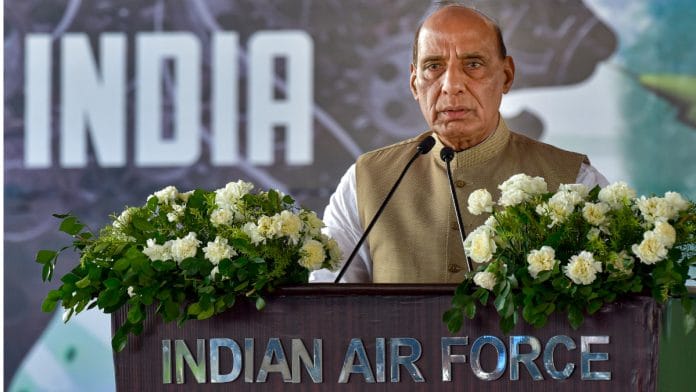New Delhi: The Taliban takeover in Afghanistan is a lesson for all and the turmoil in the region has been brought about by “aggressive designs and the active support to non-state players, by irresponsible states”, Defence Minister Rajnath Singh said Saturday.
Singh seemed to be taking a dig at Pakistan, which is being seen as a country that played a key role in the Taliban takeover of Kabul. He said the developments in the region show that violent radical forces are attempting to gain legitimacy by creating a new normal.
Singh, who was speaking at the convocation of the National Defence College in New Delhi, also said India is faced with belligerence on its land borders challenging the status-quo and increasing efforts to counter the country’s goodwill and outreach in the neighbourhood.
Noting that India is committed to peace with all, Singh said the Balakot airstrikes on Pakistan and last year’s Galwan Valley clash with China are “clear signals to all aggressors” that any attempt to threaten sovereignty will be given a “swift and befitting response”.
His comment came days after China once again accused India of transgressing the Line of Actual Control (LAC) in Galwan.
Singh stressed the need for an “all of government” approach, in which all elements of state power come together to anticipate and mitigate future challenges.
Also read: ‘What about my future?’ — Afghan students on Indian grant caught between Taliban & visa rules
‘World witness to destabilising effects of terror’
Rajnath Singh noted there is growing realisation of what India has been saying for long, about the “active support of Pakistan to violent radical and terror groups”.
“Today, the world is witness to the destabilising effects of terror and the especially dangerous precedence of violent radical forces attempting to gain legitimacy by creating new normal. The turmoil caused in the region has been brought about by aggressive designs and the active support to non-state players by irresponsible states,” he said.
Addressing Indian students, who are Brigadier and Joint Secretary rank officers, besides others from nearly two dozen countries, the defence minister said the only certainty about the evolving geopolitics is its uncertainty, adding changes in state boundaries may not be as frequent today.
“The fast-transforming structure of states and the influence that external powers can have on it is clearly evident. These events raise questions regarding the very role of power politics and the use of terrorism as a tool to change state structures and behaviour,” he said.
The minister added that the lessons students of strategic affairs should draw from the events in Afghanistan go far beyond the immediate reverberations that are being felt in the region and beyond.
He said when these events are viewed, it is tempting to believe that terrorism, fear, medieval thoughts and actions, discrimination drawn on the basis of gender, practices that are seeped in inequality and dogmatic thought, can sweep aside the wishes of the people and inclusive structures.
“Injustice, however powerful, cannot and will not defeat the collective power of the goodness that is inherent to human existence,” he said.
‘India has grown stronger in every way’
Singh said India has, in the last decade, “grown stronger in every way”, and has assumed a greater global role and responsibility.
“We are faced with belligerence on our land borders challenging the status-quo, cross-border support to terrorism, and increasing efforts to counter our goodwill and outreach in our neighbourhood,” he said.
He underlined that while India is committed to peace and goodwill among all nations, it has shown its steely resolve that threats to its internal and external security will no longer be tolerated.
“Our actions in Balakot and Galwan are clear signals to all aggressors, that any attempt to threaten our sovereignty will be given a swift and befitting response,” he said.
He also said that from a security perspective, the country and the military are acutely aware that the future military strategies and responses will need proactive synergy among all elements of the armed forces to safeguard national security interests.
(Edited by Neha Mahajan)
Also read: Afghanistan’s new Taliban govt has a clear Pakistan stamp and that’s bad news for India






